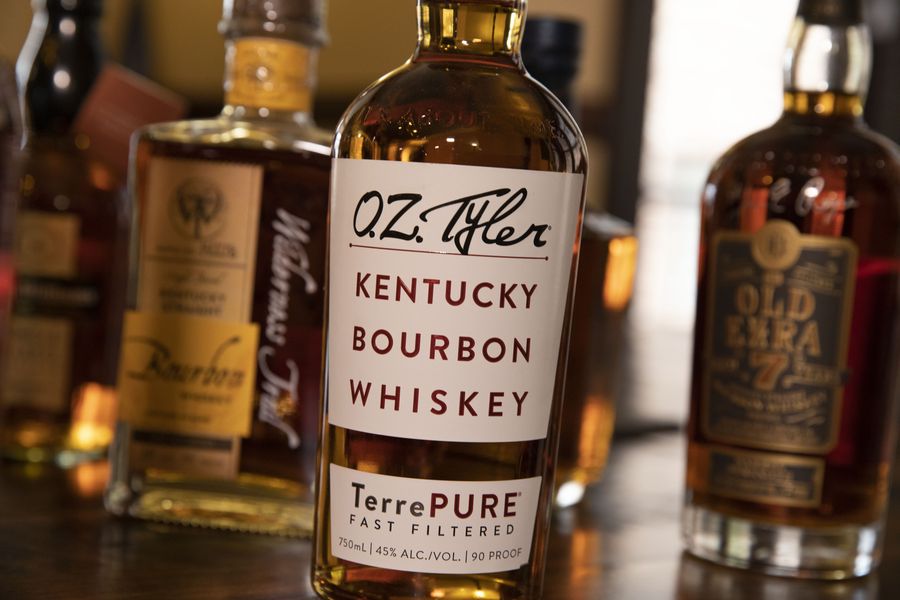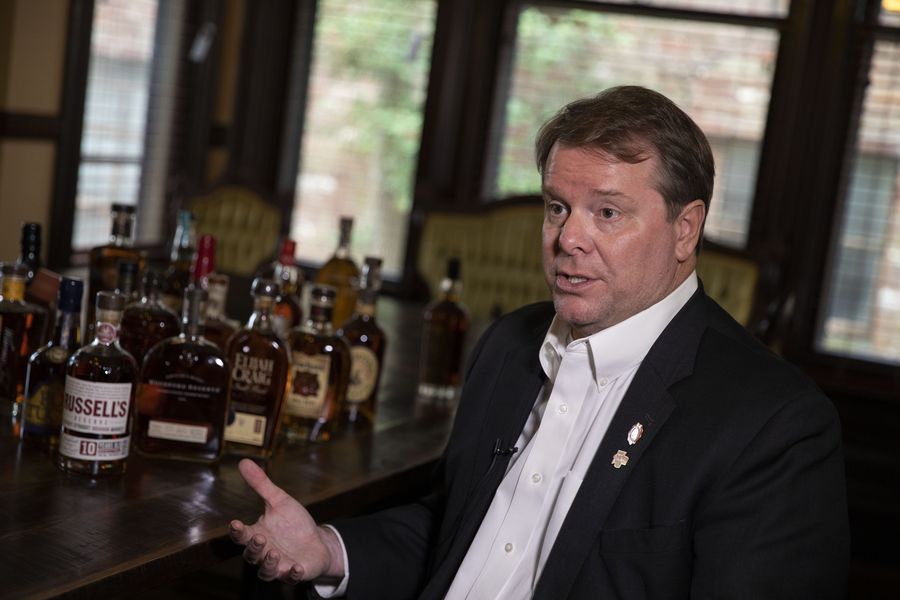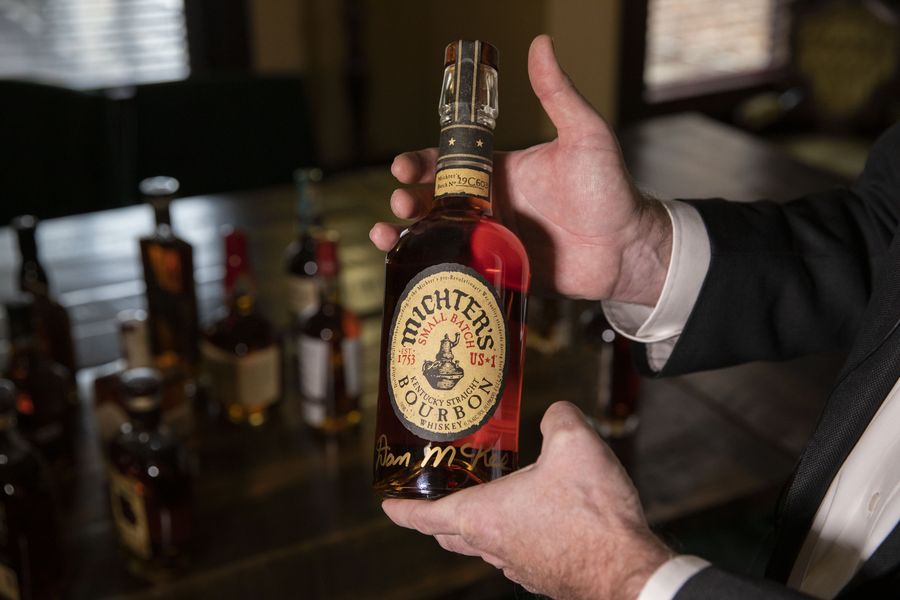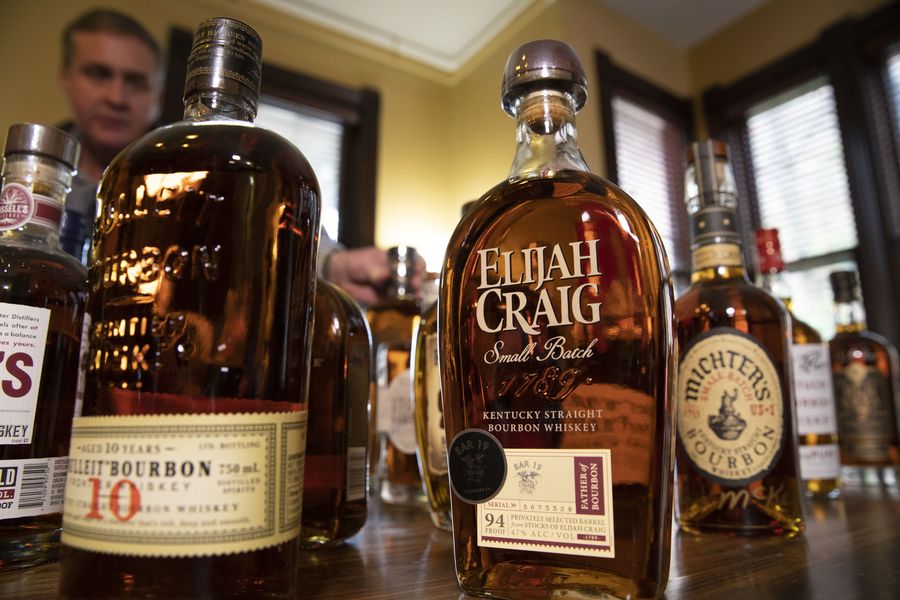
Different kinds of Kentucky bourbon whiskey are seen at the office of the Kentucky Distillers' Association (KDA) in Frankfort, Kentucky, the United States, Nov. 26, 2019. (Xinhua/Wang Ying)
Data shows about 1,200 percent increase in exports of American whiskey to China was recorded from 2001 to 2018, and the market remains largely untapped. But now, tariffs add uncertainty to the prospects of the U.S. bourbon industry.
FRANKFORT, the United States, Dec. 12 (Xinhua) -- The U.S. bourbon industry is hoping for an early end to the ongoing U.S.-provoked trade-tensions with the world's other major economies, an industry insider has said.
"We are firm believers that nobody wins in a trade war, and Kentucky bourbon is just simply collateral damage at this point," Eric Gregory, president of the Kentucky Distillers' Association (KDA) told Xinhua in a recent interview at his office in Frankfort, the state capital of Kentucky.

Eric Gregory, president of the Kentucky Distillers' Association (KDA), receives an interview with Xinhua at his office in Frankfort, Kentucky, the United States, Nov. 26, 2019. (Xinhua/Wang Ying)
Declared by the Congress in 1964 as America's only native spirit, bourbon is a type of American whiskey made primarily from corn. Around 95 percent of the world's bourbon supply is produced in Kentucky, creating an 8.6-billion-U.S. dollar industry that supports over 20,000 jobs statewide, according to the KDA.
The industry was experiencing its golden era before the summer of 2018 when the state's inventory reached a record-high in more than 40 years and over 500 million dollars' worth of Kentucky bourbon was shipped worldwide.
However, U.S. President Donald Trump's trade war with several major global economies put the brakes on the industry's vast expansion. In retaliation against U.S. tariffs hike, the European Union (EU), China, Canada and Mexico slapped tariffs ranging from 10 to 25 percent on American whiskeys, causing an 11 percent slump in their exports in the second half of 2018, according to the Distilled Spirits Council of the United States.

Eric Gregory, president of the Kentucky Distillers' Association (KDA), shows a bottle of Kentucky bourbon whiskey as he receives an interview with Xinhua at his office in Frankfort, Kentucky, the United States, Nov. 26, 2019. (Xinhua/Wang Ying)
"We're seeing a lot of impact from the tariffs," said Gregory, adding that some publicly traded companies in the industry have reported monthly revenue losses at around 12 million dollars.
Meanwhile, the abundance of bourbon in the state will cause a price war, which will impact the smaller distilleries and "probably put a bunch of them out of business," he noted.
The tariffs also added uncertainty to the industry's prospects as it takes six to eight years to make a bottle of bourbon.
"Our biggest concern is at some point when our forecasters who are looking in their crystal balls trying to figure out what the market is gonna look like in a decade. Do they start to pull back on their production? And then that could really have serious consequences for Kentucky," warned Gregory.
Though bourbon is not among traditionally popular spirits in China, it has become more prevalent among the high-income population as a consumption upgrade has been taking place around the country in recent years.
About 1,200 percent increase in exports of American whiskey to China was recorded from 2001 to 2018, and the market remains largely untapped, according to the industry data.
A Hurun Report on whiskey consumption in China, which was published last year, also pointed out that whiskey enjoyed a growth of 83 percent in "consumer preference" from 2012 to 2017, marking the biggest growth among all western liquors.

Different kinds of Kentucky bourbon whiskey are seen at the office of the Kentucky Distillers' Association (KDA) in Frankfort, Kentucky, the United States, Nov. 26, 2019. (Xinhua/Wang Ying)
"The Chinese market has considerable potential for us ... we consider (China as) one of the top emerging markets," said Gregory. "That's why the tariffs are such a concern for us, and we've been encouraging the administration to resolve those."
The Kentucky bourbon industry has been in the middle of a 2.3 billion dollar capital-building boom since five years ago, in which distilleries are expanding production, bottling facilities, and tourism facilities, and "a lot of that money is to the emerging markets like China," according to Gregory.
Several producers in the state have been on business trips to China promoting their brands, while some others have just sent a batch of samples to their potential partners there, he added.
Tariffs have made things much more complicated. "I've expanded all this production and now I've got an uncertain European market and an uncertain Chinese market," he said. "How's that going to play out?"
As the leader of the 139-year-old spirits industry lobbying group, Gregory said KDA members are "doing everything we can to encourage the administration to resolve those conflicts as much as possible."
For Kentucky, bourbon isn't just a drink. It's directly related to the state's economy, jobs, investment, tourism, culture, and history, he said. ■



